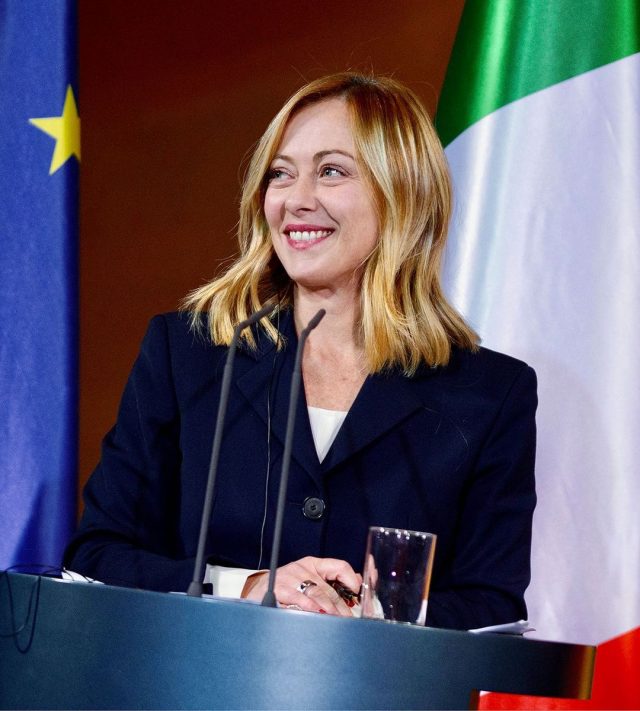
Giorgia Meloni confirmed herself as the political leader ‘most loved by Italians’ in the European elections with over 2.5 million preferences, a success that confirms Fratelli d’Italia in first place in the electoral consensus.
The Prime Minister’s party increased its consensus compared to the general election, touching 29%.
The other two parties in the majority, Forza Italia and Lega, also recorded a percentage increase, both approaching 10% of consensus with almost identical percentages, respectively 9.6% for Forza Italia and slightly above the Lega, which came in at 9%.
This is a signal of great importance and strength for the centre-right government, showing how Italians are appreciating its work and how trust in Giorgia Meloni is solid.
And probably it is precisely the new Italian political course, with the international trust won by Giorgia Meloni, that has been the driving force for the centre-right parties to achieve success throughout Europe, or almost.
The French case is emblematic, with Macron, one of Giorgia Meloni’s greatest adversaries and critics, forced to raise the white flag in the face of the overwhelming success of Le Pen’s party.
Now the games will be played in Brussels. Despite the fact that the so-called ‘Ursula Majority’ is still the strongest within the EU, the balance will have to change.
And it is Giorgia Meloni who will be the protagonist of this change of direction in EU politics.
On the strength of her consensus and as ECR President, the main grouping of European conservative parties, she will be the one to bring the new political wind blowing in Europe.
A wind that also looks to the interests of individual nations and their peoples and not to the interests of those who have hitherto dictated the law, first and foremost France of the defeated Macrone and Germany of Von der Leyen.
Migration policies, those on the ecological transition, support for Ukraine and the Middle East crisis, will necessarily have to have a different approach, less demagogic and more pragmatic and structured, just like the actions undertaken to date by the Italian leader in the national and international arena.
The first knot to be untied is certainly that of the next president of the European Commission. The EU leaders will meet in Brussels to formally nominate a candidate for the highest office of the Commission on 28 June. Theoretically, the natural candidate for the role appears to be Von der Leyen, strengthened by the confirmation of ‘her’ EPP as the first party. At the moment, however, there are several variables undermining her reconfirmation.
Article 17 of the Maastricht Treaty is the one that outlines the appointment process of the President of the European Commission, a fundamental role within the European Union. The European Council, composed of the heads of state and government of the member states, is responsible for proposing a candidate for this office. This proposal process requires a qualified majority, a mechanism that is difficult to explain and summarise, which also takes into account the population of individual states, effectively giving greater weight to the most populous states.
The European Council must take into account the results of the European Parliament elections when proposing a candidate. Once nominated, the proposed candidate must receive a vote of confidence from the European Parliament. Therefore, it is essential that the candidate proposed by the Council has the support of a parliamentary majority.
The selection process is extremely complicated, with negotiations and variables of different kinds, which is why an informal meeting is held immediately after the election to start preliminary discussions. At this stage, the name of Ursula von der Leyen, the current President of the European Commission, is particularly relevant. Before the elections, in fact, the European People’s Party (EPP) had chosen her as candidate through the spitzenkandidat mechanism, an indication that is certainly important but not binding.
This will therefore be the first knot to untie in the renewed European Union, to succeed in finding a synthesis between different ‘souls’ that can lead to the election of a new president.
And although the forces in the field seem to be mapped out, with the EPP first party and the Ursula majority potentially in command as mentioned, the games are by no means done. Suffice it to say that in 2019, with a strength on paper greater than the current one, Von der Leyen won by only 9 votes short of the absolute majority required. And one of the main obstacles to her re-election could come from France and Macron.
That the French do not ‘love’ the German President is a well-known fact, as Macron himself pointed out on 25 April in his ‘Speech on Europe’, in which without ever mentioning her he attacked the current policies of the European Council. But it is precisely in France that the vote will take place a few days after the first meeting in Brussels, the meeting from which the name of the presidential candidate should emerge. A big problem for the French President, who would suffer a further blow to his credibility if he were to give his support to Von der Leyen.
So the game is wide open, despite a potential majority, the vote for the election is influenced by several factors, first and foremost the ‘internal’ interest of each nation. Among other things, the possibility of being elected president is not replicable, the loser must step aside and a new name must be proposed. And so the fundamental role that the Giorgia Meloni-led ECR will certainly play, on the strength of its successes in the recent European elections and its numbers.
At the moment no one is risking hypotheses or possible candidates, but negotiations have certainly been underway for some time, and we are certain that even during the Italian-led G7, one of the unofficial topics will be precisely this.
The ‘revolution’ has begun and Giorgia Meloni has all the cards to win it together with her European allies.
FeMo



 Subscribe
Subscribe